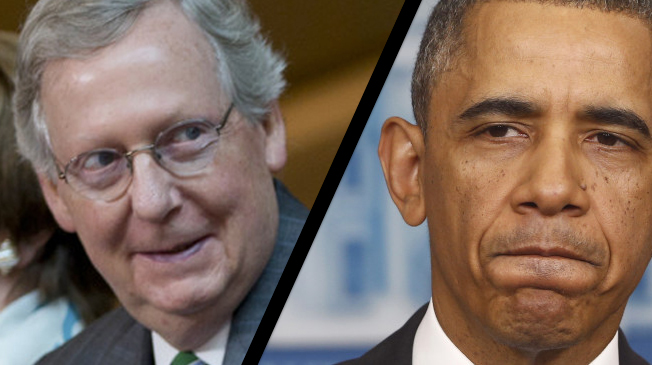Republicans have a leg up in the Senate races in 2014, and election forecasters say they have a real chance of winning the six seats necessary to take the majority.
In that scenario, Sen. Mitch McConnell of Kentucky will probably be the next majority leader. A shrewd, ruthless politician with an ax to grind, McConnell has been a painful thorn in the side of President Obama as minority leader. Controlling the Senate would make him more fearsome.
“I think that it would be a really difficult time for Obama,” said Norm Ornstein, a centrist scholar at the American Enterprise Institute.
Here are four ways a Majority Leader McConnell could make the president’s life miserable.
1. Nuke The Senate Rules
McConnell openly threatened to eliminate the filibuster entirely if Senate Democrats took the historic step of scrapping it for most presidential nominations — which they did last fall. That makes it easier for a Majority Leader McConnell to justify using the so-called nuclear option to kill the minority blocking tool with a simple majority.
And he could do more. McConnell could, for instance, employ 51 votes to change the rules to require a supermajority of senators to pass any tax increase.
“The worst case scenario includes doing away with the filibuster on legislation, if only as retaliation for what the Senate Democrats did last year, to renew their focus on abortion legislation, and to set a new threshold requiring a supermajority of 67 [votes] for tax increases,” said Jim Manley, a lobbyist and former longtime spokesman for Senate Majority Leader Harry Reid (D-NV). “That would be a rules change and McConnell could do it with a bare majority.”
2. Resurrect Government Shutdowns And Hostage-Taking
It took conservatives three years and a self-defeating government shutdown to stop threatening economic disaster to force conservative fiscal reforms — and that’s when they controlled just the House. Controlling the Senate as well would re-energize the tea party movement and put new pressure on Republicans to attach right-wing measures to government funding legislation and debt limit hikes, which they could pass out of Congress and dare Obama to veto.
“We could end up with more confrontation over shutdowns and the debt limit if Republicans, under pressure from the right, decide to push for draconian [policy] changes,” said Ornstein.
“The House and Senate could pass all sorts of crazy legislation,” Manley said. “Now, the bottom line is President Obama would still have the veto pen, but you can rest assured that his wrist would be given a vigorous workout for the final two years of his term. … Republicans could throw everything and the kitchen sink from crazyland and make him veto it.”
McConnell, who is tacking rightward as he faces a primary challenger, would feel tea party pressure on a personal and institutional level. And he’s known to relish confrontation.

3. Grind The Executive & Judicial Branches To A Halt
There are currently 136 executive and judicial nominations pending — some will be filled this year, but more will keep opening up. One powerful weapon in McConnell’s arsenal would be to refuse to bring up nominations unless the president makes concessions on what sorts of people he nominates or on unrelated policy matters.
“My guess is they’ll put a stop to a host of nominations and try to use that process for hostage-taking and leverage,” said Ornstein. “You want this nominee? Then you’re going to have to give us something in return.”
Under a Majority Leader McConnell, said Manley, every White House nomination would be “subject to negotiation.” Among other things, it would make it harder for Obama to fire top administration officials, knowing that getting new executive picks confirmed would be a slog.
The White House would have to deal with McConnell and secure some Republican buy-in every time it wanted to get someone confirmed. The executive branch could become less functional if large numbers of cabinet or sub-cabinet positions aren’t filled, and district and circuit court seats could remain vacant if Republicans decide to run out the clock on Obama.
In divided government, “nominees become much trickier for the president to get confirmed,” said Sarah Binder, a professor of political science at George Washington University and senior fellow at the Brookings Institution. “[It] will also spell more deadlock on nominations because the GOP will put the breaks of filling judgeships until after the 2016 presidential election.”
4. Benghazipocalypse
Controlling the Senate would greatly amplify the GOP’s power to launch investigations aimed at embarrassing the White House and potential Democratic candidates for the 2016 elections.
“It’ll be Darrell Issa on steroids,” said Manley.
“My guess is they’ll do a one-two punch,” said Ornstein. “[Oversight Committee Chair] Issa in the House and a host of committees in the Senate going after Obama, demanding investigations and issuing subpoenas, and trying to really screw up the administration’s ability to do anything. … It’ll be Benghazi, Benghazi Benghazi; IRS, IRS, IRS.”
Manley, who worked with many incumbent senators as a Reid aide, shed light on which hypothetical committee chairmen would create the most trouble for Obama.
“The most problematic would be Chuck Grassley as chairman of the Judiciary Committee,” he said. “He’d probably make the remaining two years of the Obama administration a living hell by calling for a flurry of letters, subpoenas and oversight investigations — on Guantanamo, legal marijuana, deportation policy. … And how could we forget fucking Jim Inhofe, the environment’s worst friend, as chairman [of the Environment and Public Works Committee].”






